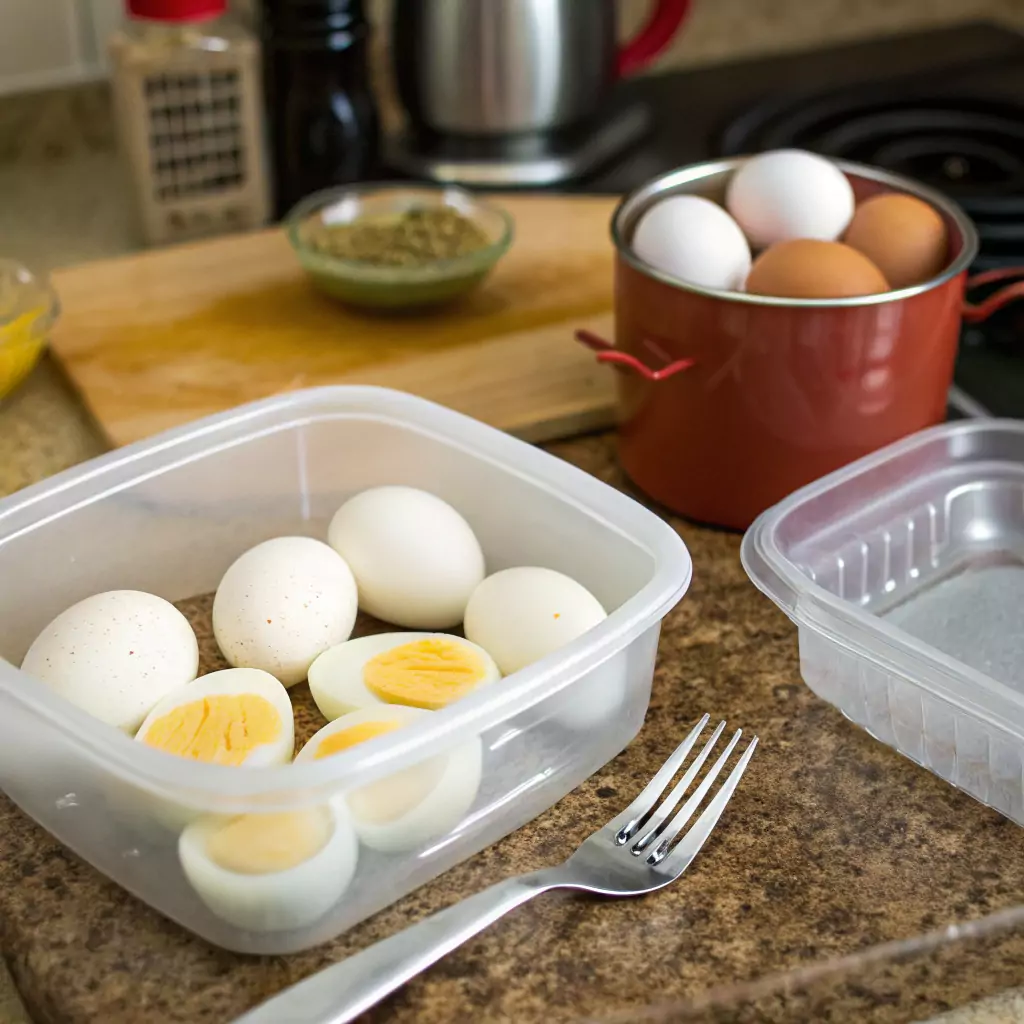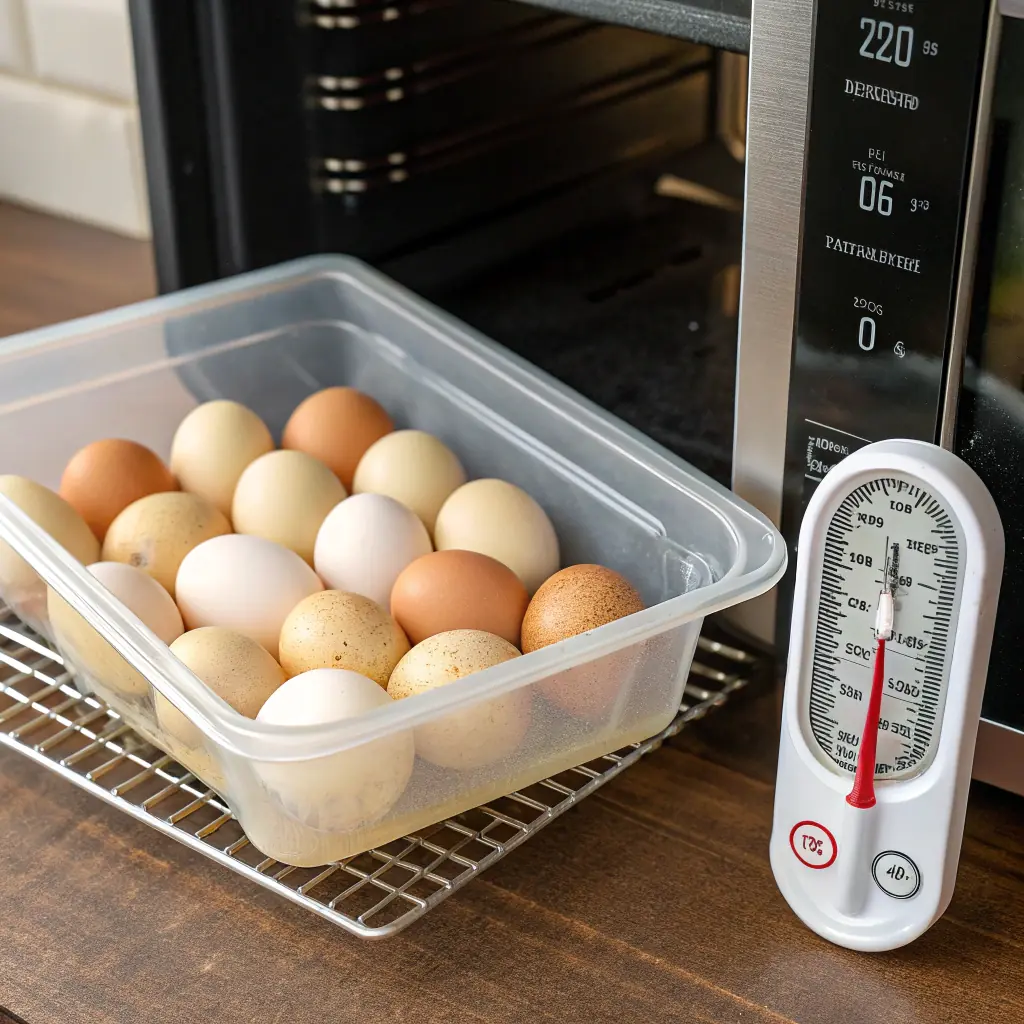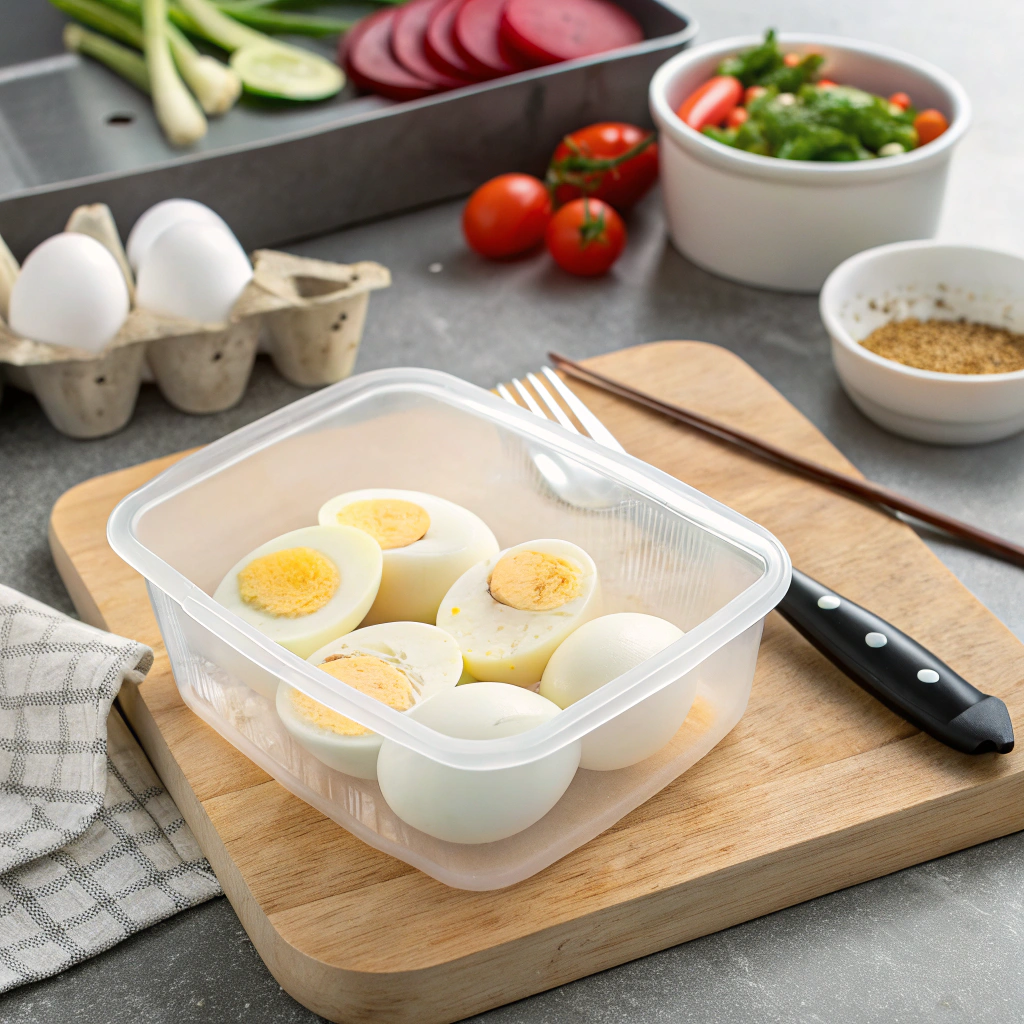Cooking microwave hard boiled eggs is quick and easy. It’s a great way to make a healthy snack or meal. By following a few simple steps, you can get perfect results. This skill is useful for anyone, whether you’re busy or a student.
Our complete guide will teach you how to cook perfect microwave hard boiled eggs. We aim to give you tips and tricks for success. Learning to cook microwave hard boiled eggs means you can enjoy a fast and easy snack or meal.For other recipes, visit this link.
Introduction to Microwave Egg Cooking

Microwave-safe container with microwave hard-boiled eggs, a fork nearby to pierce the eggs, and kitchen utensils in the background, highlighting the quick and easy preparation process.
Cooking eggs in the microwave is a time-saver. With a few easy steps, you can make perfect microwave hard boiled eggs. Our guide will show you how, so you can get great results every time.
Key Takeaways
- You can cook perfect microwave hard boiled eggs with a few simple steps
- Microwave hard boiled eggs are a convenient and healthy snack or meal option
- Cooking eggs in the microwave saves time and effort
- Our guide provides tips and tricks for achieving great results
- Mastering the art of cooking microwave hard boiled eggs is a valuable skill
- Microwave hard boiled eggs, or oeufs durs au micro-ondes, can be cooked to perfection with our guide
Safety First: Important Precautions for Microwaving Eggs
When cooking eggs in the microwave, safety is key. It’s important to know the risks and take steps to avoid accidents. The risk of explosion is a big concern if eggs aren’t cooked right. A recette rapide d’oeufs can help you cook eggs safely and easily.
To avoid explosions, use the right tools and handle eggs carefully. Here are some important steps to follow:
- Use a microwave-safe container to cook your eggs
- Handle the eggs gently to avoid cracking
- Cook the eggs for the recommended time to avoid overcooking
By following these steps and using a cuisine facile au micro-ondes method, you can cook eggs safely. Always put safety first when microwaving eggs. This way, you can enjoy a tasty and healthy meal.
| Equipment | Safety Precautions |
|---|---|
| Microwave-safe container | Use to cook eggs and avoid explosion risk |
| Egg handler | Use to handle eggs gently and avoid cracking |
Required Equipment for Perfect Microwave Eggs
To make a quick and tasty breakfast, you need the right tools. Cooking eggs in the microwave is easy with the right equipment. A microwave-safe container is key to cook eggs evenly and avoid explosions.
Here are the basic tools you’ll need to get started:
- A microwave-safe container with a lid
- A fork for piercing the eggs
- A plate for serving
Choose a container made for microwave use. This ensures your eggs are cooked safely and well. With the right tools, you can enjoy a tasty and simple breakfast, thanks to microwave eggs.
| Equipment | Description |
|---|---|
| Microwave-safe container | For cooking eggs evenly and preventing explosions |
| Fork | For piercing eggs and preventing bursting |
| Plate | For serving cooked eggs |
With these simple tools, you’re ready to make a delicious breakfast. Cooking for one or many, the right equipment makes a big difference in your eggs’ quality.
How to Make Microwave Hard Boiled Eggs Step by Step
To make perfect microwave hard boiled eggs, follow a simple process. Start by preparing your eggs, making sure they are clean and dry. This step is key for even and safe cooking. Use a recette simple d’oeufs to help you.
Next, think about the water temperature and level. The right water and temperature are crucial for cooking your eggs just right. An astuce pour le petit-déjeuner au micro-ondes can offer valuable tips for the perfect cook.
Preparing Your Eggs
Before cooking, pierce the eggshell with a fork to prevent cracking. Then, place the eggs in a microwave-safe container. Add water to the recommended level.
Water Temperature and Level
The water level should cover the eggs but not overflow. The ideal cooking temperature is between 180°F and 190°F.
Cooking Time Guidelines
Cooking time varies with the number of eggs and your desired doneness. Cook for 30-45 seconds per egg. Adjust this time based on your preference.
Cooling Process
After cooking, transfer the eggs to a bowl of ice water. This stops the cooking process. It prevents overcooking and ensures the right doneness.
The Science Behind Microwaving Eggs
Microwaving eggs is a quick way to prepare a meal. But, have you ever thought about how it works? The science behind microwaving eggs is quite interesting. It helps you cook them better.
The microwave uses energy to make water molecules in the eggs vibrate fast. This vibration creates heat. The heat then cooks the egg white and yolk. The moisture and heat transfer are key to the egg’s texture and taste.
Here are some important things to think about when microwaving eggs:
- Moisture content: The water in the egg affects cooking time and texture.
- Heat transfer: The microwave energy must reach the egg and cook it evenly.
- Cooking time: The time needed depends on the microwave’s power and the egg’s size.
Understanding the science of microwaving eggs helps you get perfect results. Whether you need a quick snack or a fast meal, microwaving eggs is a good choice. With practice, you can cook eggs in the microwave like a pro.
| Egg Size | Cooking Time | Power Level |
|---|---|---|
| Large | 30-45 seconds | High |
| Medium | 20-30 seconds | Medium |
| Small | 10-20 seconds | Low |
Common Mistakes to Avoid When Microwaving Eggs
When cooking eggs in the microwave, it’s key to avoid common mistakes. These can make your eggs overcooked or undercooked. To get eggs just right, pay attention to temperature, timing, and the container you use. A well-cooked dish is a great addition to any meal, but it needs careful attention.
Some common mistakes include not controlling the temperature well. This can make eggs explode or get too hard. Also, timing issues can lead to eggs that are not cooked enough or are overcooked. Using the wrong container can cause uneven cooking or even break the eggs.
Temperature Control Errors

Microwave-safe container with eggs, thermometer for checking internal temperature, and microwave with power settings, emphasizing proper temperature control.
To avoid temperature issues, use a microwave-safe container. Adjust the cooking time based on your microwave’s power. It’s also important to use a thermometer to check the eggs’ internal temperature.
Timing Mistakes
Timing mistakes can be fixed by following a recipe or guidelines for microwave cooking. Start with a short cooking time and check the eggs often. This way, you can avoid overcooking and get your eggs just right.
Container Selection Problems
Choosing the right container is crucial when microwaving eggs. Pick a microwave-safe container that’s big enough for the eggs and any extra ingredients. Don’t use metal containers, as they can cause uneven cooking or even start a fire.
Tips for Perfect Yolk Consistency
Cooking oeufs durs au micro-ondes can be tricky. You might want your yolks runny or firm. Here are some tips to help you get it right.
Cooking time is key. Too long, and yolks are dry. Too short, and they’re runny. Cook large eggs for 30-45 seconds, adjusting as needed.
Temperature matters too. Your microwave’s power affects cooking. Use a consistent power level for best results. A thermometer can also help check egg temperature.
Here are more tips for perfect yolks:
- Cook eggs in a single layer for even cooking
- Use a microwave-safe container to prevent eggs from breaking
- Don’t overcook your eggs – check on them frequently to avoid overcooking
Follow these tips and experiment with cooking times and temperatures. Fresh eggs and safe cooking are also important. This way, you’ll get perfect yolk consistency every time.
| Cooking Time | Yolk Consistency |
|---|---|
| 30-45 seconds | Runny |
| 45-60 seconds | Firm |
| 60-90 seconds | Overcooked |
Storage and Shelf Life of Microwave Boiled Eggs
After cooking your eggs in the microwave, it’s key to store them right. This keeps them fresh and safe to eat. Storing eggs properly stops bacteria from growing.
Keep your microwave boiled eggs in the fridge at 40°F (4°C) or colder. Use a covered container to keep out moisture and other harmful stuff. These eggs stay good for 7 to 10 days in the fridge.For other recipes, visit this link.
Proper Storage Methods
- Store eggs in a covered container to prevent moisture and other contaminants.
- Keep eggs in the refrigerator at a temperature of 40°F (4°C) or below.
- Use eggs within 7 to 10 days of cooking.
Signs of Spoilage
Check your eggs often for signs they’ve gone bad. If you see any of these, it’s time to throw them away:
- Cracks or breaks in the eggshell.
- Slime or mold on the eggshell or egg white.
- Off smell or taste.
By storing eggs right and checking for spoilage, you can enjoy them longer. This easy microwave method makes cooking and storing eggs simple.
| Storage Method | Shelf Life |
|---|---|
| Refrigerator | 7 to 10 days |
| Freezer | Up to 6 months |
Creative Ways to Serve Your Microwave Hard Boiled Eggs
Now that you know how to cook eggs in the microwave, it’s time to get creative. You can make a variety of dishes using this technique.
Breakfast Ideas
Start your day with a delicious breakfast. Slice the eggs and add them to a breakfast burrito or scramble. You can also top avocado toast with them. Or, mix them with spinach, cherry tomatoes, and citrus vinaigrette for a salad.
Salad Combinations
Microwave hard boiled eggs are perfect for salads. Mix them with greens, cherry tomatoes, cucumber, and a homemade vinaigrette for a quick lunch. They’re also great in a Cobb salad or as a topping for a grain bowl.
Snack Suggestions
Microwave hard boiled eggs are a great snack alone or with other foods. Try them with carrot sticks and hummus or on a rice cake with almond butter. They’re also good in a snack salad with greens, cherry tomatoes, and citrus vinaigrette.
| Breakfast Idea | Ingredients | Instructions |
|---|---|---|
| Breakfast Burrito | Microwave hard boiled eggs, tortilla, cheese, salsa | Scramble the eggs, add cheese, salsa, and wrap in a tortilla |
| Avocado Toast | Microwave hard boiled eggs, avocado, toast, salt, pepper | Mash the avocado, slice the eggs, and serve on top of toast |
Troubleshooting Common Issues
When cooking eggs, you might run into some common problems. We’ve put together a list of tips to help you fix these issues.
Issues like overcooking or undercooking are common. To solve these, it’s key to follow a simple recipe and adjust cooking time as you like.
Here are some tips to troubleshoot common issues:
- Check the egg size and adjust the cooking time accordingly
- Use a thermometer to ensure the water has reached the correct temperature
- Don’t overcrowd the pot, as this can affect the cooking time
By following these tips and using a simple recipe, you can cook eggs perfectly. Remember to stay calm and adjust your technique as needed for the best results.
As you keep practicing, you’ll get better at cooking eggs. With a simple recipe and patience, you’ll soon enjoy delicious, perfectly cooked eggs.
Conclusion: Mastering the Art of Microwave Egg Cooking
Microwaving hard boiled eggs is easy and saves time. It just needs a bit of practice. Follow the tips in this article to get better at it.
Always be careful and watch the cooking time. Try different water temperatures and containers to get the yolk just right. With a little patience, you’ll make tasty microwave hard boiled eggs for breakfast or snacks.
Start enjoying the quick and simple world of microwave egg cooking. It’s a great way to make delicious eggs fast.
FAQ
How long do you cook eggs in the microwave?
Cooking time for microwave hard boiled eggs depends on several factors. These include the number of eggs, your microwave’s wattage, and egg size. Here’s a rough guide: cook 1-2 eggs for 3-5 minutes, 3-4 eggs for 5-7 minutes, and 5-6 eggs for 7-9 minutes. Always check the eggs to ensure they’re cooked to your liking.
How do you know when microwave eggs are done?
To check if your microwave eggs are done, look for these signs: – The whites should be set and opaque. – The yolks should be cooked to your liking, whether soft, medium, or hard. – The eggs should feel hot when pressed with a fork. – If they’re still runny, microwave them in 30-second intervals until they’re done.
Can you microwave eggs in the shell?
No, it’s not safe to microwave eggs in the shell. The rapid heat can cause them to explode. Always remove the eggs from their shells before microwaving.
How do you prevent microwave eggs from exploding?
To avoid exploding eggs, follow these steps: – Use a microwave-safe container and pierce the yolks with a fork before cooking. – Add a small amount of water to prevent drying out. – Check the eggs frequently to avoid overcooking. – Let the eggs rest for a few minutes after cooking to prevent exploding.
Can you reheat microwave hard boiled eggs?
Yes, you can reheat microwave hard boiled eggs carefully. Place them in a microwave-safe container with a bit of water. Microwave in 30-second intervals, stirring between each interval, until they’re hot. Be careful not to overheat, as this can make them rubbery or dry.
Perfectly Cook Microwave Hard-Boiled Eggs 🥚
Craving a quick and easy way to make hard-boiled eggs? Skip the stovetop and try this foolproof method to make perfectly cooked eggs in the microwave! Fast, simple, and flawless every time! 💡🎉
Ingredients:
- 4 large eggs
- 2 cups water (room temperature)
- 1/2 teaspoon salt (optional, to prevent eggs from cracking)
Instructions:
- Prepare the Bowl:
Place the eggs in a microwave-safe bowl. Make sure the bowl is deep enough to fully submerge the eggs in water. - Add Water & Salt:
Pour enough water into the bowl to cover the eggs by about an inch. Add salt to the water if desired—it helps minimize the risk of cracking. - Microwave Carefully:
Microwave on medium power (50-70%) for 7–8 minutes for soft-boiled eggs or 9–11 minutes for hard-boiled eggs. Adjust time based on your microwave’s wattage. - Cool Down Quickly:
Using tongs or a spoon, transfer the eggs to an ice water bath immediately after microwaving. Let them sit for 5 minutes to cool and stop the cooking process. - Peel and Enjoy:
Gently crack the shell, peel under running water, and enjoy your perfectly cooked eggs!
Prep Time: 2 minutes
Cook Time: 7–11 minutes
Total Time: 10–13 minutes
Servings: 4 eggs
Calories per Egg: 68
🌟 Tips:
- Always use a deep, microwave-safe bowl to avoid water boiling over.
- If unsure about timing, start with 7 minutes and add time as needed.
- Use an ice water bath to make peeling the eggs a breeze.
This quick microwave hack will save you time and deliver flawless hard-boiled eggs every time! Give it a try and let me know how it works for you. 😊

